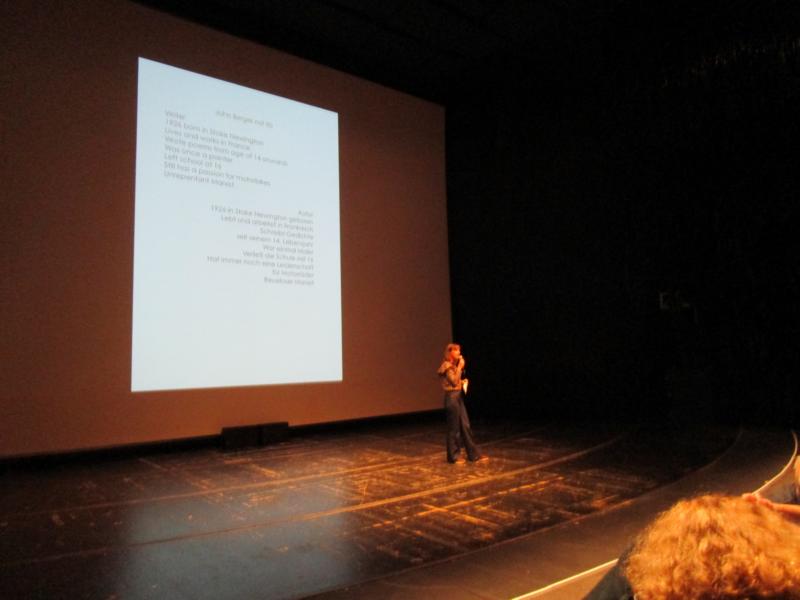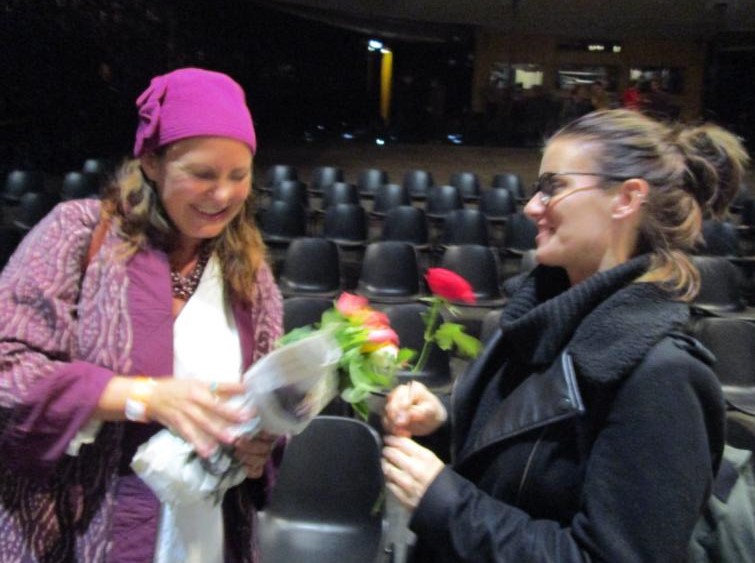John Berger - die Kunst des Sehens
Anlässlich / in honor of John Bergers 90. Geburtstag
John Berger oder
Die Kunst des Sehens/The Art of looking/La mémoire du regard‘
am 7 November 2016, 22.00
Eine Veranstaltung der Volksbühne am Rosa-Luxemburg-Platz, in Kooperation mit ZDF/Arte, dem Internationalen Literaturfestival Berlin und der Ma.ja.de.Filmproduktion
Tickets: 8,00 / 6,00 E. unter 030 240 65 777 oder www.volksbuehne-berlin.de
Fernseh-Ausstrahlungen außerdem:
SRF / Schweiz auf: 'Sternstunde Kunst' Sonntag, 30.11. / 11:55 + 23.20 h
ZDF + Arte / Deutschland: Mittwoch, 2.11.2016 / 23:20 h
SVT / Schweden auf: ‚K special‘ Mittwoch, 2.12.2016, 20 h
ARTE / Frankreich Donnerstag, 03.11.16 / 00h35
Cordelia Dvorák mit Elisabeth Baulitz
Ein Film von Cordelia Dvorák, Deutschland, 2016
54’ min., HD 1920/1080, color
Preview: Montag, 7. November 2016 / 22:00
Volksbühne am Rosa Luxemburg Platz Berlin
Im Anschluss: Gespräch mit Piotr Rosolowski (Kameraman), Cordelia Dvorák (Regisseurin & Autorin), Barbara Burckhardt (Theater heute), Hans Jürgen Balmes (Übersetzer und Lektor Bergers / Fischer Verlag)
Eine Grundbedingung für das Drehen des Filmes war für Cordelia Dvorák sehr schwierig, denn John Berger wollte seine Texte vorlesen. Und da er sehr viele Bücher, neben Gedichten, Artikeln, Essays auch Romane geschrieben hatte, wäre das Lesen von Romanen sehr zeit aufwendig gewesen, zumal sie einen Film von 54 Minuten drehen musste. So war es für sie ganz interessant als es zum Schneiden des Filmes kam, nach welchen Passagen die er vorlas, konnte etwas anderes eingeblendet werden, so dass das Lesen selber nicht so künstlich vorkommt. Auch lockerte sich das Verhältnis von John Berger zusehends als sie filmten. Und zwischen drinnen gab es immer Champagne, Wiskey in den Pausen, was wiederum zur Lockerung und zur nahen Beziehung beitrug.
Der Vergleich mit Peter Handke, der als Ich-Erzähler im Vergleich zum Wir-Erzähler eines John Bergers sich schwer tat, laut Hans Jürgen Balmes, seine Laudatio Rede zu Ehren von John Berger zu halten. Allzu viel Kritik habe er da unter gebracht, obwohl er zuerst sehr von Bergers Texten begeistert gewesen war. Grund mag sein dass Handke auf dem Land lebt während Berger von der Stadt aufs Land zog, so dann mag Handke ungerne seine Monopol-Position bezüglich einer Bezogenheit aufs Ländliche aufgeben wollen. Das Gespräch im Bezug auf Handke kam auf als die Moderatorin kurz erwähnte dass Piotr Rosolowski als Kameraman ebenso einen Spiel von Handke machte und im Vergleich schien es Barbara Burckhardt, dass er eine viel größere Nähe zu Berger schaffte während bei Handke eine bestimmte Distanz stets bestimmend war.
Berger als Erzähler geht auf in der Vielfalt seiner Darstellungsmöglichkeit. Aber er beschwört geradezu die Kamera als wäre sie eine Schlange.
Hans Jürgen Balmes hob im Gespräch außerdem hervor, wie sehr John Berger nicht den Text selber, sondern die Gedanken davor, übersetzt haben wollte. Einmal schickte er ihm eine Tonbandaufzeichnung seines Textes und schrieb dazu, er solle den Text hören, nicht lesen. John Berger traute ohnehin nicht sehr viel der Sprache zu. Das Sehen, die Augen, nehmen weitaus mehr auf als was gesagt oder beschrieben werden kann.
Noch etwas ist so wichtig an dieser Person John Berger. Er hat durchaus seinem ganzen Leben an einer Linie festgehalten. Er bezieht sich als ehemaliger Marxist immer noch auf Gramsci und blieb in diesem Sinne ein Rebell.
Als die Moderatorin Barbara Burchhardt das Publikum fragte, wer hätte noch etwas zu fragen oder hinzu zu fügen, stand ein älterer Herr auf und gratulierte Cordelia Dvorák für solch einen ausgezeichneten Film weil er einem Mut macht alt zu werden. Anhand von John Berger kann so etwas einen erfassen. John Berger meint wir brauchen den Tod um uns selber an die eigene Mortalität, nicht Immortalität zu erinnern.
John Berger “Self-Portrait”
"I have been writing for about eighty years. First letters then poems and speeches, later stories and articles and books, now notes. The activity of writing has been a vital one for me; it helps to make sense and continue. Writing, however, is an off-shoot of something deeper and more general – our relationship with language as such. And the subject of these few notes is language.
Let’s begin by examining the activity of translating from one language to another. Most translations today are technological, whereas I’m referring to literary translations. The translation of texts which concern individual experience.
The conventional view of what this involves proposes that the translator or translators study the words on one page in one language and then render them into another language on another page. This involves a so-called word-for-word translation, and then an adaptation to respect and incorporate the linguistic tradition and rules of the second language, and finally another working-over to recreate the equivalent of the “voice” of the original text. Many – perhaps most – translations follow this procedure and the results are worthy, but second-rate.
Why? Because true translation is not a binary affair between two languages but a triangular affair. The third point of the triangle being what lay behind the words of the original text before it was written. True translation demands a return to the pre-verbal.
*
One reads and rereads the words of the original text in order to penetrate through them to reach, to touch the vision or experience which prompted them. One then gathers up what one has found there and takes this quivering almost wordless “thing” and places it behind the language it needs to be translated into. And now the principal task is to persuade the host language to take in and welcome the “thing” which is waiting to be articulated.
This practice reminds us that a language cannot be reduced to a dictionary or stock of words and phrases. Nor can it be reduced to a warehouse of the works written in it.
A spoken language is a body, a living creature, whose physiognomy is verbal and whose visceral functions are linguistic. And this creature’s home is the inarticulate as well as the articulate.
*
Consider the term “mother tongue”. In Russian the term is “rodnoy-yazik”, which means “nearest” or “dearest tongue”. At a pinch one could call it “darling tongue”.
Mother tongue is one’s first language, first heard as an infant from the mouth of one’s mother. Hence the logic of the term. I mention it now because the creature of language, which I am trying to describe, is undoubtedly feminine. I imagine it’s centre as a phonetic uterus.
Within one mother tongue are all mother tongues. Or to put it another way – every mother tongue is universal.
Noam Chomsky has brilliantly demonstrated that all languages – not only verbal ones – have certain structures and procedures in common. And so a mother tongue is related to (rhymes with?) non-verbal languages – such as the languages of signs, of behavior, of spatial accommodation.
When I’m drawing, I try to unravel and transcribe a text of appearances, which already has, I know, its indescribable but assured place in my mother tongue.
Words, terms, phrases can be separated from the creature of their language and uses as mere labels. They then become inert and empty. The repetitive use of acronyms is a simple example of this. Most mainstream political discourses today is composed of words which, separated from any creature of language, are inert and dead. And such dead “word-mongering” wipes out memory and breeds a ruthless complacency.
*
What has prompted me to write over the years is the hunch that something needs to be told and that if I don’t try to tell it, it risks not to be told. I picture myself as a stop-gap man rather than a consequential, professional writer.
After I’ve written a few lines I let the words slip back into the creature of their language. And there, they are instantly recognized and greeted by a host of other words, with whom they have an affinity of meaning, or of opposition, or of metaphor or alliteration or rhythm. I listen to their confabulation. Together they are contesting the use of which I put the words I chose. They are questioning the roles I allotted to them.
So I modify the lines, change a word or two, and submit them again. Another confabulation begins.
And it goes on like this until there is a low murmur of provisional consent. Then I proceed to the next paragraph.
Another confabulation begins.
Others can place me as they like as a writer. For myself I’m the son of a bitch – and you can guess who the bitch is, no?"
« The making of art - discourse with Jan Brüggemeier | Culture »



